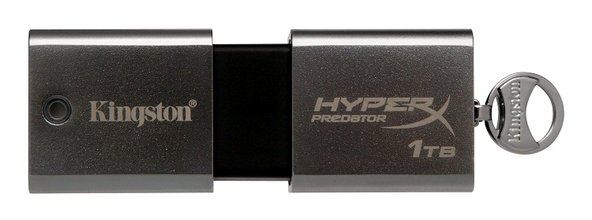Imagine a Terabyte of data stored in a device no bigger than a cigarette lighter. That’s the Kingston HyperX Predator 1 Terabyte drive recently on display at the Consumer Electronics Show in Las Vegas. Kingston is known for memory, solid-state and USB drives as well as microSD and compact flash cards. But a 1 Terabyte flash drive represents a new capacity high.
The drive connects to your computer through a USB 3.0 compatible port that is also backward compatible to USB 2.0. USB 3.0 read speeds are 240 Megabits per second. Write speeds are 160 Megabits per second.
Who would want such a large flash drive? Time will tell whether this type of device will be a market success. But just to give you an idea of what you can possibly store on a 1 Terabyte flash drive:
- Up to 108 full length movies uncompressed
- Or1,365 full length movies using standard compression algorithms
- Up to 250,000 songs or enough listening material for a year
Kingston will start shipping in the first quarter of 2013. If anything is going to contribute to this device failing it is its price. Kingston has listed it through distribution at 1,750 U.S. Compare that to USB hard drives of that size at 1/20th the price. But if you still are in the market for a big USB flash drive then order the 512 Gigabyte HyperX Predator currently on sale for less than half the price of the 1 Terabyte model.
















This sort of technology could in principle give each child a very cheap electronic “brain” containing the entire Wikipedia knowledge base. The question is whether knowledge and intelligence should be controlled and rationed by political governments and commercial interests through some sort of evolving fee-based cloud computing/communication system, or whether universal knowledge and intelligence should be free and independent birthrights of all humanity.
The solid-state flash drive concept stores information passively, requiring a small amount of energy only to read and write. That means a hypothetical child’s companion Teddybot, highly competent in natural language and using present battery technology, could operate for weeks without recharging. The same would be true for portable tablet computers, which would expend 95% of their battery-power driving display screens and speakers. In contrast to large independent knowledge bases, the “cloud computing” concept seems a bad idea. Flash drive, or solid-state hard-drive, technology makes large independent knowledge and logical algorithm storage both reliable and cheap.
The Chinese, unencumbered by intellectual property rights, are probably no more than a decade away from achieving the world’s most intelligent population. Every Chinese citizen will have his or her own private electronic AI person that joins him in infancy, molds his natural language-based mind, and accompanies him throughout life. Of course each Chinese citizen’s AI person will periodically dump data back to “big brother” so “little brother” won’t get to “misbehave” much before “big brother” comes knocking.